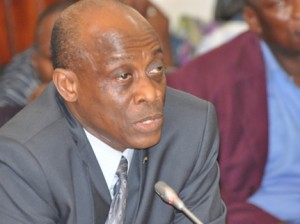Ghana to use part of $600m sovereign wealth fund to manage shortfall in crude revenue – Minister

The Minister of Finance, Seth Terkper says the country would use part of its sovereign wealth fund, which has accumulated $600 million to manage current economic challenges brought about by the shortfall in projected oil revenue.
Speaking at the opening of the Financing the Future Conference in Accra, Ghana, March 17, 2015, he said the stabilisation fund has accumulated $600 million so far.
Mr. Terkper noted that since the country attained its middle income status, access to concessional financing has decreased significantly.
“Inflows from our development partners are highly volatile showing a cyclical effect (especially in election year when DPs adopt a wait-and-see approach to aid delivery). These developments together with government’s quest to sustain its national economic policy objectives (as contained in the Ghana Shared Growth and Development Agenda), are compelling us to diversify our sources of financing and also improve on its delivery,” he said.
According to him, the Ghanaian economy has been stable over three decades and expanding, combining improvements in macroeconomic management, progress in social intervention and strong export growth in the last decade.
He said, “economic growth has pushed Ghana into the Lower Middle Income bracket and accelerated poverty reduction. Consistent economic growth since 2000 has nearly cut poverty levels in half, as of 2006, using 1990 as the base year. Ghana is consequently on track and has met her MDG target of halving extreme poverty well before the 2015 target.”
He however admitted that in spite of the recent strong economic growth and prospects, the Ghanaian economy has had to contend with some challenges.
“There has been policy mismanagement (eg. wages and subsidy and external shocks. Poverty levels are still relatively high, the country’s infrastructure base needs to be expanded (despite investments that has exposed the country to high debt levels in recent years; the economy needs to be upgraded to keep pace with its middle income status. Given the country’s current fiscal space constraint, there is a significant financing gap,” he said.
The minister indicated among others things that, “in addition to securing bilateral and multilateral funding, there will be the need to identify alternative and innovative sources of funding as we move into the future.”
In this regard, he said, emerging powers are also attempting to be a significant source of new financing in the development process eg. Badea, China Exim, CDB, Turkey Exim, ADB/AfDB, BRIC Bank.
“These emerging powers will generally provide their resources as part of integrated packages involving trade, investment, and other commercial ventures,” he said.
Mr. Terkper urged that the traditional approach to the funding of projects through tax revenues, domestic borrowing, external loans, foreign grants and donor support, have to be complemented by other financing strategies.
“Government therefore has to strike a balance between borrowing levels that will not jeopardize the country’s credit rating and solving the overarching problems of infrastructure development, hence the need for a Public-Private Partnerships,” he said.
The two day Financing the Future Conference, with the theme, “Fresh perspectives on global development” ends Wednesday March 18, 2015.
By Emmanuel K. Dogbevi
